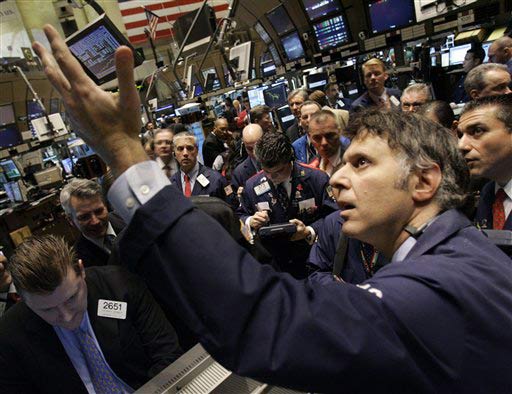Testosterone Fuels Stock Market Success

As bleary-eyed traders prepare for the market to open, they might want to check their blood levels. A high testosterone reading could predict a stellar day with above-average profits, a new study suggests.
The research, detailed in the April 22 issue of the journal Proceedings of the National Academy of Sciences, focused on 17 male London financial stock traders for eight days. Testosterone levels fluctuate naturally with age (there's a surge during male puberty and a drop-off as men age) and as a result of daily encounters, such as competitive events and sexual behavior.
Each trader's testosterone levels were higher on days when profits exceeded his one-month daily average than on other days. With elevated testosterone, traders may experience more confidence and risk-taking appetite — qualities that could bolster trading performance, the researchers suggest.
But there's also a down-side. Too much testosterone or prolonged elevation could lead to impulsive decisions and extreme risk-taking, the researchers say, turning a trader's profits into losses.
Built-in buffer
A built-in buffer could keep testosterone-induced financial risk-taking in check. The traders in the study showed spikes in levels of cortisol, a hormone that plays a role in how we respond to stress, associated with higher market volatility. Rising cortisol, they say, can reduce a person's inclination to take risks, possibly over-riding the effect of testosterone.
That risk-inhibiting effect can become somewhat permanent. If financial market volatility were to rise for an extended time, the researchers say, a trader could experience persistently elevated cortisol and persistently avoid taking risks. Also, too much testosterone can cause problems.
Sign up for the Live Science daily newsletter now
Get the world’s most fascinating discoveries delivered straight to your inbox.
"Rising levels of testosterone and cortisol prepare traders for taking risk," said lead researcher John Coates of the University of Cambridge in England. "However, if testosterone reaches physiological limits, as it might during a market bubble, it can turn risk-taking into a form of addiction, while extreme cortisol during a crash can make traders shun risk altogether."
The study was funded by a slush fund in the university's budget, not by any outside concern.
Meaning in grim economy
The hormone connection is pertinent in today's grim economy.
"In the present credit crisis, traders may feel the noxious effects of chronic cortisol exposure and end up in a psychological state known as 'learned helplessness,'" Coates said. "If this happens central banks may lower interest rates only to find that traders still refuse to buy risky assets. At times like these, economics has to consider the physiology of investors, not just their rationality."
To Harvard economist Terry Burnham, the results make both scientific and common sense, adding to a burgeoning field of research at the boundary of economics and life sciences.
"The notion that testosterone is related to financial risk-taking will not be particularly surprising to most people," said Burnham, director of economics at Acadian Asset Management, and who was not involved in the current research. "Hormones are increasingly being shown to play important roles in economic behavior."
However, he added, biology is often "messier" than the clean-cut numbers embraced by many scientists, including economists and social scientists.
"To economists and many other academics, common sense is often at odds with mathematical convenience," Burnham told LiveScience. "Thus, the realities of a messy, wet biological human nature, as documented in this study and others, ought to serve as a loud knock on the hermeneutic doors of closed-minded social scientists."
Jeanna Bryner is managing editor of Scientific American. Previously she was editor in chief of Live Science and, prior to that, an editor at Scholastic's Science World magazine. Bryner has an English degree from Salisbury University, a master's degree in biogeochemistry and environmental sciences from the University of Maryland and a graduate science journalism degree from New York University. She has worked as a biologist in Florida, where she monitored wetlands and did field surveys for endangered species, including the gorgeous Florida Scrub Jay. She also received an ocean sciences journalism fellowship from the Woods Hole Oceanographic Institution. She is a firm believer that science is for everyone and that just about everything can be viewed through the lens of science.










